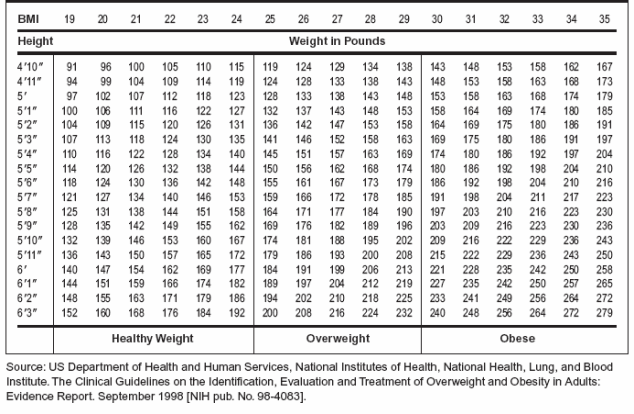Find Your Body Mass Index (BMI)
Body mass index (BMI) is a number based on height and weight that can help estimate whether someone is at a healthy weight. For most adults, BMI is a useful guide, but it doesn’t tell the whole story. Other factors also affect whether a person’s weight is healthy.
What is BMI?
Body mass index, or BMI, is one tool used to tell whether a person is at a healthy weight. BMI is often used to help tell if your weight might put you at risk for health problems such as heart disease, diabetes, and cancer.
Your weight and height are used to find out your BMI number. In general, the higher the number, the more body fat a person has.
BMI is used mainly to define different weight groups in adults age 20 years or older.
- Underweight: BMI is less than 18.5
- Normal weight: BMI is 18.5 to 24.9
- Overweight: BMI is 25 to 29.9
- Obesity: BMI is 30 or more
In adults, BMI is calculated the same way for both men and women. There are several ways to find your BMI. (See below for information about how to calculate BMI in children and teens.)
Limitations and concerns about the use of BMI
BMI gives a good estimate of total body fat for most people, but it doesn’t work well for everybody. There are other things to think about when judging how much someone should weigh. For example:
- Bodybuilders or other very muscular people can have a high BMI because of their muscle mass, even though they’re not necessarily in the overweight range for BMI.
- BMI can also underestimate body fat in people who have lost muscle mass, such as some older people.
A person with a high BMI should be evaluated by a health care provider. The provider might use other factors such as skinfold thickness (a measure of body fat), waist size, evaluations of diet and family health problems, and other factors to find out if someone’s weight might pose health risks.
Enter your height and weight below to find your body mass index (BMI)
Your BMI is
Underweight
Below 18.5
Normal weight
18.5-24.9
Overweight
25-29.9
Obese
30 and higher
Note: The BMI may not be accurate for people with greater muscle mass (such as athletes) or in older people and others who have lost muscle mass.
Charts are another way to find your BMI. To use the table below, find your height on the left side of the chart, then go across to the weight that is closest to yours. At the top of the chart you can see your BMI and at the bottom of the chart you can see which category you fit into – underweight, healthy weight, overweight, or obesity.

Some examples:
This table shows that a person who is 5 ft. 4 in. tall is in the overweight range (BMI is 25 to 29) if they weigh between about 145 and 169 pounds. They are in the obese range (BMI is 30 or more) if they are 174 pounds or more.
A person who is 5 ft. 10 in. tall is in the overweight range (BMI is 25 to 29) if they weigh between 174 and 202 pounds. They are in the obese range (BMI is 30 or more) if they are 209 pounds or more.
You can also calculate your own BMI.
The actual formula to determine BMI uses metric system measurements: weight in kilograms (kg) divided by height in meters, squared (m2).
When using pounds and inches, the formula needs to be altered slightly. Multiply your weight in pounds by 703. Divide that by your height in inches squared:
BMI = (your weight in pounds × 703) ÷ (your height in inches × your height in inches)
For example:
Weight: 120 pounds
Height: 5 ft. 3 in. (63 in.)
BMI = (120 × 703) ÷ (63 × 63) or 84,360 ÷ 3,969 = 21.3
This is well within the healthy weight range.
BMI can be calculated the same way for children and teens as it is for adults, but the numbers don’t have the same meaning. This is because the normal amount of body fat changes with age in children and teens and is different between boys and girls. BMI levels for children and teens are calculated using age and sex.
To account for this, the US Centers for Disease Control and Prevention (CDC) has developed age- and sex-specific growth charts. These charts are used to translate a BMI number into a percentile based on a child’s sex and age. The percentiles are then used to determine the different weight groups:
- Underweight: less than the 5th percentile
- Normal weight: 5th percentile to less than the 85th percentile
- Overweight: 85th percentile to less than the 95th percentile
- Obesity: 95th percentile or higher
An easy way to determine your child’s BMI percentile is to use the CDC’s online BMI percentile calculator.
- Written by
- References

The American Cancer Society medical and editorial content team
Our team is made up of doctors and oncology certified nurses with deep knowledge of cancer care as well as editors and translators with extensive experience in medical writing.
American Cancer Society. Cancer Prevention & Early Detection Facts & Figures 2025-2026. Atlanta: American Cancer Society; 2025. Available at https://www.cancer.org/content/dam/cancer-org/research/cancer-facts-and-statistics/cancer-prevention-and-early-detection-facts-and-figures/2025-cped-files/cped-cff-2025-2026.pdf
Centers for Disease Control and Prevention. Child and teen BMI calculator. 2024. Accessed at https://www.cdc.gov/bmi/child-teen-calculator/ on August 15, 2025.
Centers for Disease Control and Prevention. Childhood Obesity Facts. 2024. Accessed at https://www.cdc.gov/obesity/childhood-obesity-facts/childhood-obesity-facts.html on August 15, 2025.
Wu Y, Li D, Vermund SH. Advantages and limitations of the body mass index (BMI) to assess adult obesity. International journal of environmental research and public health. 2024 Jun;21(6):757. doi:10.3390/ijerph21060757
Last Revised: September 9, 2025
American Cancer Society medical information is copyrighted material. For reprint requests, please see our Content Usage Policy.
More Resources
More Interactive Tools
American Cancer Society Emails
Sign up to stay up-to-date with news, valuable information, and ways to get involved with the American Cancer Society.







